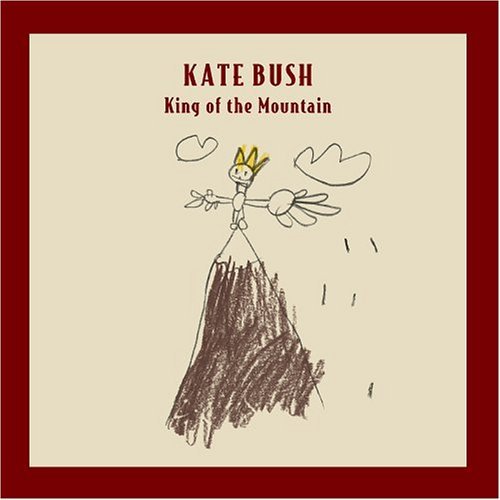Irish Wolfhounds of Love
Thu. November 24, 2005Categories: Abstract Dynamics

… Or, further thoughts, some of them mine, on Aerial….
Well, the Blog revival continues – Woebot, heronbone, the brilliant It’s All in Your Mind* and even the mighty Pillbox+ have all emerged from their cryonic comas recently – with the welcome return of Church of Me, back with an essential post on Kate Bush. Aerial, with its themes of grief and joy, of a return to the world, is, after all, a perfect Church of Me record. It begins with a song that is either about ghosts or heaven (a place where everyone is ‘king of the mountain’) or both, and it’s shadowed throughout, nowhere more intensely and poignantly than on its brightest moments, by an awareness of the omnipresence of death. The affirmation it musters comes not from an extirpation of the morbid so much as an aknowledgement that it is death’s winged chariot which drags everything forward; ‘death is present in every becoming’, as Deleuze and Guattari put it in Anti-Oedipus.
Marcello is right to correct the claim (made by me amongst others) that the first disc is ‘a prelude, or a softener, to disc two’. A week’s further listening has made me incline to his view that A Sky of Honey ‘defines everything at which the songs of disc two laugh, or ridicule, or negate. In other words, the simple and complex joys of A Sky Of Honey would not carry nearly as much emotional impact were we not aware of the tragedies slowly being dissected on disc one.’ A Sea of Honey is psychoanalysis, A Sky of Honey, schizoanalysis…
I was driven back to the first disc in part by Tim Finney’s remarks on the Dissensus Aerial thread. ‘I’ve found its appeal more ambiguous and awkward but also very insidious. “A Coral Room” in particular is quite astonishing,’ Tim wrote of A Sea of Honey. ‘Oddly it’s almost a reversal of Hounds of Love: here the concept side is the immediately arresting, sparkling, extroverted part, while the “conventional songs” side is quiet, “difficult”, containing hidden depths…’ That’s quite right: the songs here are abstract, demanding, exploratory. Partly that’s because, as Marcello observes, the songs have a quality of pensiveness, as if Bush is reflecting on them while she is singing them.
Marcello’s post makes me realise that I had stressed the maternal and domestic themes running through A Sea of Honey while downplaying its treatment of grief and loss. In fact, two of the most powerful songs on the first disc – ‘Mrs Bartolozzi’ and ‘A Coral Room’ – are about BOTH the maternal-domestic AND grief. In her interview with Mark Radcliffe on Radio 2, Bush was amused that people found ‘Mrs Bartolozzi’ humorous and even silly, since she considered it one of the heaviest songs she’s written. Marcello hears it as the working through of a trauma, focusing on the opening lines, pregnant with Pinterian menace: “I remember it was that Wednesday/Oh when it rained and rained/They traipsed mud all over the house/It took hours and hours to scrub it out.” ‘The words shiny, clean and white keep reoccurring’ so much ‘that you wonder: what horror is she trying to erase? Who were “they”? The Gestapo? Come to take her husband and children away? Was Mrs. Bartolozzi…interfered with?’ The song’s strength lies in its studied ambiguity, its refusal to arbitrate between the banal and the world-historic; the ‘they’ could equally well be children returning from playing in the garden…
‘A Coral Room’, meanwhile – Bush’s meditation on her own mother’s death – is indeed quietly harrowing. Accompanied only by an icy piano, Bush takes us out on a boat as she scatters her mother’s ashes onto a lake. In both ‘Mrs Bartolozzi’ and ‘A Coral Room’ water – which will become the medium of dream-transformation on A Sky of Honey – is painfully intimate, the elixir of (domestic) life (and site of its memorialization).
* One of Philip’s new posts is about Elvis, or rather about the urge to step into his 68 black leather jacket that the likes of Robbie and Morrissey apparently find irresitable. Elvis, of course, is the principal – or should that be ostensible? – subject of ‘King of the Mountain’.
+ Penman’s return is a poem written on the year anniversary of Jhon Balance’s death. Coil come to mind frequently while listening to Aerial: English pastoral, light, elementalism…
In her conversation with Mark Radcliffe, Bush came across as friendly but, if not quite evasive then certainly deflective, unwilling to disclose the song’s mysteries. She confirmed that one of the concepts-conceits from which A Sky of Honey grew was the relationship between birdsong and light. A Sky of Honey she said, was a return to the methodology she used to construct song suite on the second side of Hounds of Love, but on a grander scale – a kind of Irish Wolfhounds of Love, she quipped. A Sky of Honey was deliberately composed to be listened to in one sitting in part as a resistance to the fragmentation of the album form brought about by mp3 micro-modularization.
Robert O’Toole has a number of Deleuzian posts on Aerial, including this and this.